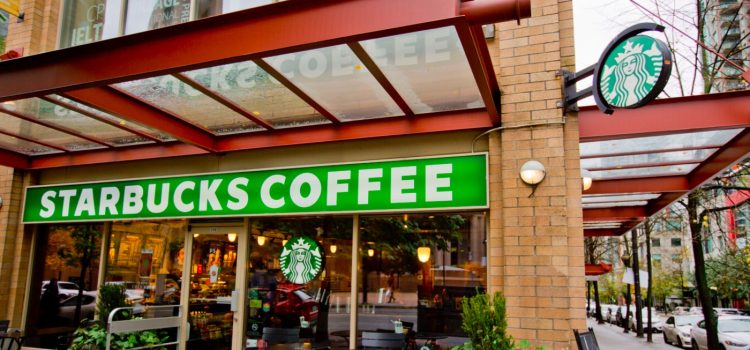

This article is an excerpt from the Shortform book guide to "Onward" by Howard Schultz. Shortform has the world's best summaries and analyses of books you should be reading.
Like this article? Sign up for a free trial here.
What are Starbucks’s values and business principles? What makes Starbucks special compared to other coffee shops?
In 1982, Starbucks was just a small coffee shop in Seattle, Washington. After Howard Schultz took over, it became a franchise that customers, employees, and stockholders loved.
Let’s look at how Schultz made Starbucks the special coffee franchise it is today.
Why People Love Starbucks
Schultz explains that his relationship with Starbucks began in 1982 when he joined the company as a marketing professional. At the time Starbucks was small and local to Seattle, Washington. As part of a work assignment, Schultz traveled to Italy, where he was inspired by the pleasurable cafe experiences he had there to start his own coffeehouse company. In 1987, his company acquired Starbucks and chose to keep the Starbucks name, at which point Schultz became Starbucks’ first CEO. In many ways, Schultz is responsible for what makes Starbucks special.
(Shortform note: As Starbucks’ head of marketing, Schultz focused on enhancing customers’ in-store experience. He realized that many customers felt intimidated by Starbucks because they knew so little about coffee, so he encouraged employees to be more welcoming and developed educational pamphlets. When Schultz acquired the company, he expanded its value to consumers by transforming it from a coffee retailer into a cafe, incorporating community-centric aspects of Italian coffee culture. Ironically, despite its Italian influences, Starbucks had initial difficulty expanding into the Italian market—including a bout of arson by locals—but has since achieved success due to its demonstration of cultural relevance and sensitivity.)
From the beginning, Schultz’s vision for the company was to balance making profits with uplifting humanity. Schultz stepped down to become Starbucks’ chairman of the board and chief global strategist in 2000, but his successor, Orin Smith, carried this vision forward. Schultz explains that over the years, Starbucks provided unique value for customers, employees, suppliers, stockholders, and global society and the environment:
Starbucks provided value to customers by offering a distinct coffeehouse experience that fused artisanal coffee, meaningful employee-customer relationships (achieved by having employees face customers as they made their drinks), and a comfortable “third place” setting (a space outside of home and work where people could gather).
Starbucks provided value to employees by endowing them with a healthy, rewarding work environment and uncommonly good benefits (for example, even part-time employees were entitled to health insurance and stock options).
Starbucks provided value to suppliers by treating them ethically (for example, ensuring coffee farmers were paid more fairly by participating in the Fairtrade certification system).
Starbucks provided value to stockholders by growing the business and expanding globally (Starbucks’ value nearly tripled between 2000 and 2005).
Starbucks provided value to global society and the environment by contributing to humanitarian causes and environmental education campaigns.
| Starbucks: An Early Practitioner of “Conscious Capitalism” Under Schultz’s leadership, Starbucks became an early practitioner of what business experts John Mackey and Raj Sisodia call conscious capitalism: a way of doing business that benefits all stakeholders instead of just one group (stockholders). In their book Conscious Capitalism, Mackey and Sisodia explain that conscious capitalism isn’t just a feel-good ethical guideline—by efficiently balancing stakeholders’ diverse interests, businesses that practice conscious capitalism also boost their sustainability and profitability. In contrast, when a company prioritizes one group of stakeholders’ interests over another group’s, it risks making the neglected stakeholders unhappy, which can impede the company’s success over time. Schultz says Starbucks provides three forms of value to customers: Artisanal coffee. In 2000, experts observed that Starbucks had expanded the market for artisanal coffee even outside the walls of its stores, since competing coffee producers had to innovate to keep up with the demand Starbucks introduced. Face-to-face employee-customer relationships. Research suggests that facilitating direct interactions between employees and customers helps employees realize the impact they have on those they serve, which motivates them to give customers a better experience. A third place to gather. Experts believe third places have slowly faded over the 21st century, which suggests Starbucks was providing an increasingly rare yet still valuable offering to US consumers. However, some disagree about whether Starbucks serves as a satisfying third space, and Starbucks is pivoting from its third place strategy in the post-pandemic world. Schultz says Starbucks provides value to employees in the form of rewarding work and uncommonly good benefits. Due to its treatment of employees, Forbes has repeatedly ranked Starbucks on many of its lists of best places to work. However, some experts disagree with this consensus, alleging labor law violations, a lack of a living wage, and illegal suppression of union activity. Schultz states that Starbucks provides value to suppliers by treating them ethically. As Schultz mentions, one way it does this is through the Fairtrade certification system, which not only ensures fair pay but also enforces labor rights. Starbucks also partners with Fairtrade to provide loans to farmers who need help growing and protecting their livelihoods. However, Starbucks has also been entangled in child and slave labor controversies (and associated lawsuits) regarding their suppliers. Schultz explains that Starbucks provides value to stakeholders by growing the business and expanding globally. As of 2024, Starbucks has continued to grow since the time of Onward’s publication and remains immensely valuable, outperforming all its competitors. This trend has doubtlessly generated massive wealth for Starbucks’ major shareholders, including Schultz himself. Finally, Schultz says that Starbucks provides value to global society and the environment, but this claim is contentious. For example, Starbucks has been criticized for its tax avoidance strategies in Europe, which some say unfairly divert money from welfare programs, and for contributing to plastic pollution. However, Starbucks reports several initiatives aimed at benefiting these stakeholders, such as a hunger relief program and a climate change initiative. |

———End of Preview———
Like what you just read? Read the rest of the world's best book summary and analysis of Howard Schultz's "Onward" at Shortform.
Here's what you'll find in our full Onward summary:
- Why Starbucks CEO Howard Schultz left and later returned to the company
- Schultz’s three-part strategy that saved Starbucks from potential ruin
- Why millions of people love Starbucks’ coffeehouse experience






